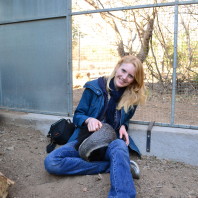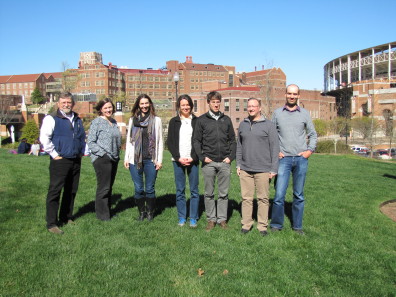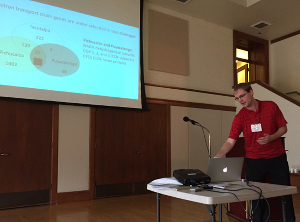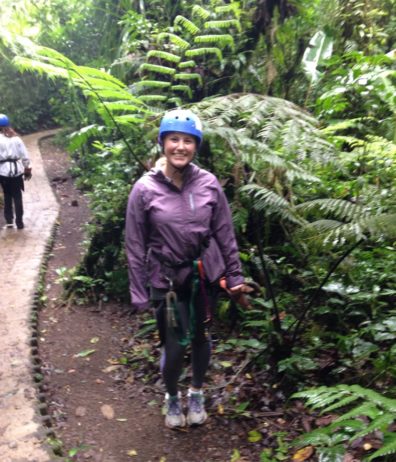Lab trip to Lower Granite Dam
joanna.l.kelleyWe had the pleasure of visiting the Lower Granite Dam on the Snake River in Eastern Washington. We visited the juvenile fish facility, adult fish facility and the hydroelectric dam. All parts of the tour were fascinating. We watched juvenile fish being weighed, measured and assessed for health and then shuttled onto a barge for their downstream transport. We had the opportunity to watch adult Chinook salmon get PIT tags and measured as they work their way up the fish ladder. Finally, we saw the hydroelectric dam and inside of the power house. It’s well worth a trip to visit the dam any time you’re in the area!
Rivulus genome published
joanna.l.kelleyWe are very happy to announce the mangrove rivulus (Kryptolebias marmoratus) genome has been published in GBE. The paper can be found online [linked here]. This is the culmination of several years of sequencing, annotating and analyzing. We are very happy to present this resource to the community. The data can be accessed on NCBI GenBank accession LHSH00000000. This is an exciting and interesting species and we hope the genome facilitates all areas of research involving K. marmoratus and teleosts more generally.
Congratulations to Michael Saxton for becoming a PhD Candidate!
joanna.l.kelleyCongratulations to Michael Saxton for becoming a PhD Candidate! Michael Saxton passed his qualifying exam and his proposal defense! Congratulations to Michael for completing these just weeks prior to your Alaska adventure!
Congratulations to Anthony Brown for passing his qualifying exam!
joanna.l.kelleyCongratulations to Anthony Brown for passing his qualifying exam! Anthony is now a PhD Candidate!
Congratulations to Kayla Cribbin for presenting her Honors Thesis!
joanna.l.kelleyCongratulations to Kayla Cribbin for presenting her Honors Thesis! Kayla’s Honors Thesis is titled: Sequencing the Transcriptome of the Tropical Gar and Measuring Differential Expression between Males and Females. She did a great job! Kayla received a Pass with Distinction on her Honors Thesis.
Alex Fraik receives the NSF Graduate Research Fellowship
joanna.l.kelley Congratulations to Alex Fraik who has been selected to receive a 2016 National Science Foundation (NSF) Graduate Research Fellowship!
Congratulations to Alex Fraik who has been selected to receive a 2016 National Science Foundation (NSF) Graduate Research Fellowship!
The NSF Graduate Research Fellowship Program recognizes and supports outstanding graduate students in NSF-supported science, technology, engineering, and mathematics disciplines who are pursuing research-based Master’s and doctoral degrees at accredited United States institutions.
In Alex’s words: “For my dissertation, I propose to determine how adaptive genomic variation varies spatially across the geographic range of the Tasmanian devil. I will use genome scan methods to identify candidate loci that are targets of selection in devil populations. Using statistical outlier test I will identify loci in devils associated with tumor haplotype to test for adaptation of disease strain to host genome. I will conduct RNA-sequencing on samples collected across environmental gradients and on devils infected with different tumor strains to determine if there are differences in gene expression indicative of clinal adaptation to local environments, and association of tumor strain to host genomes, respectively.”
Joanna Kelley participates in NIMBIOS Computational Landscape Genomics Working Group
joanna.l.kelley
Joanna Kelley participates in NIMBIOS Computational Landscape Genomics Working Group. We had a very productive working group at NIMBIOS discussing current challenges and opportunities in Landscape Genomics.
Anthony Brown receives The Guy Brislawn Scholarship Award in Biology
CoreyCongratulations to Anthony Brown for receiving The Guy Brislawn Scholarship Award in Biology! This award is given annually to honor graduate students in Biology who exhibit high academic achievement and exceptional potential for becoming productive scientists and/or teachers. The candidate is considered with regards to GPA, publication and presentation history, and similar evidence of scholarship. Congrats Anthony!
Anthony Brown presents at BGSA symposium
Corey Anthony Brown, presents at the 6th annual Graduate Research Symposium about his project: The genomic basis of adaptation to extremely sulfidic environments in three independent fish (Poecilia ssp.) populations. This symposium is a flagship event for the School of Biological Sciences at WSU and a great opportunity to explore the wide range of research interests being pursued within SBS.
Anthony Brown, presents at the 6th annual Graduate Research Symposium about his project: The genomic basis of adaptation to extremely sulfidic environments in three independent fish (Poecilia ssp.) populations. This symposium is a flagship event for the School of Biological Sciences at WSU and a great opportunity to explore the wide range of research interests being pursued within SBS.




